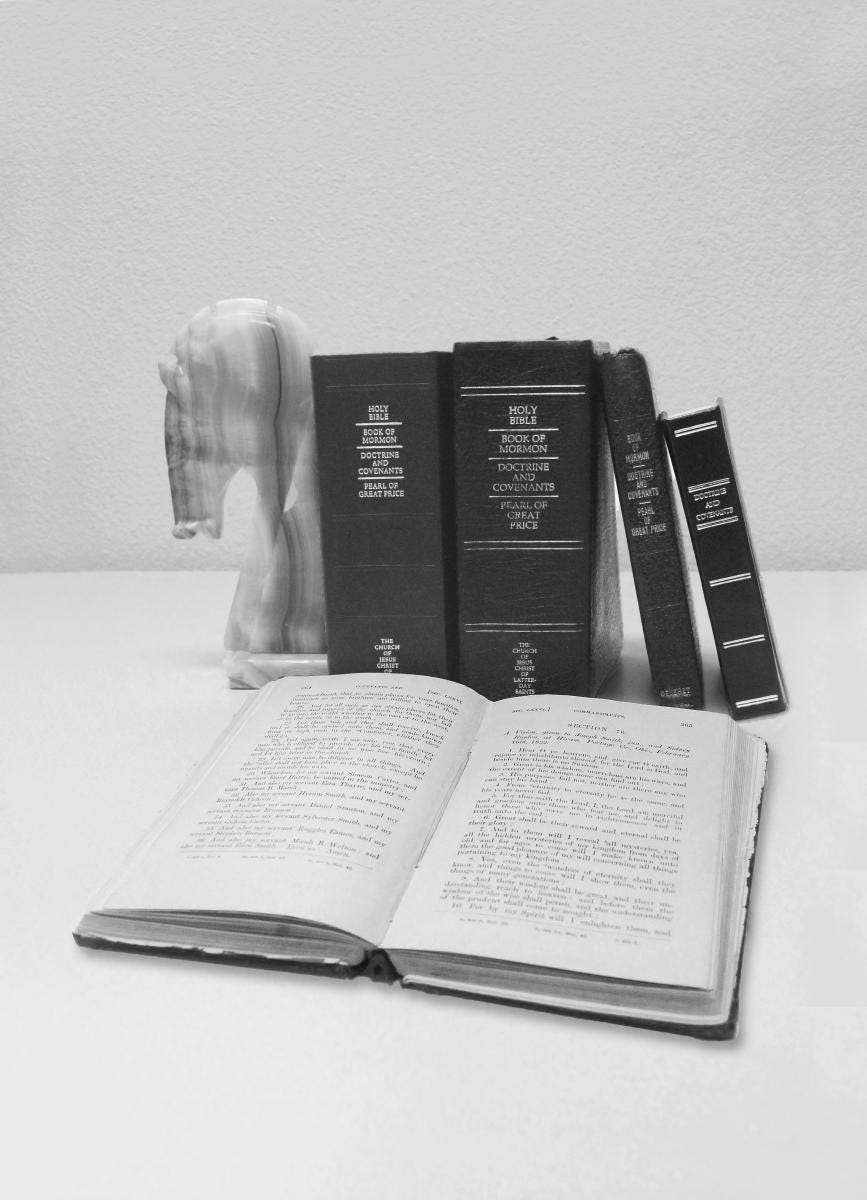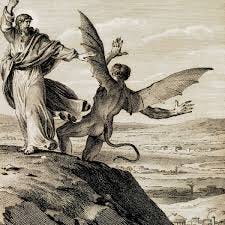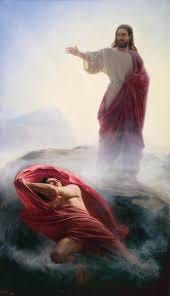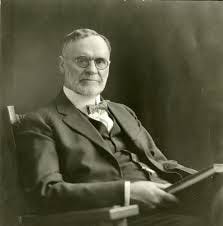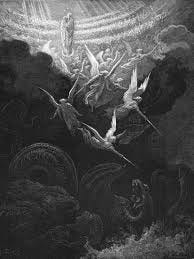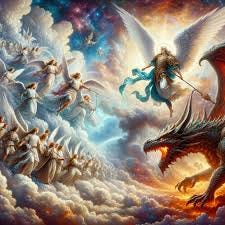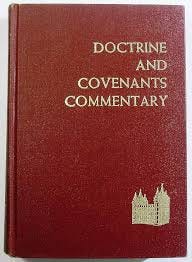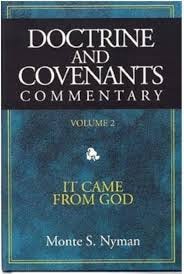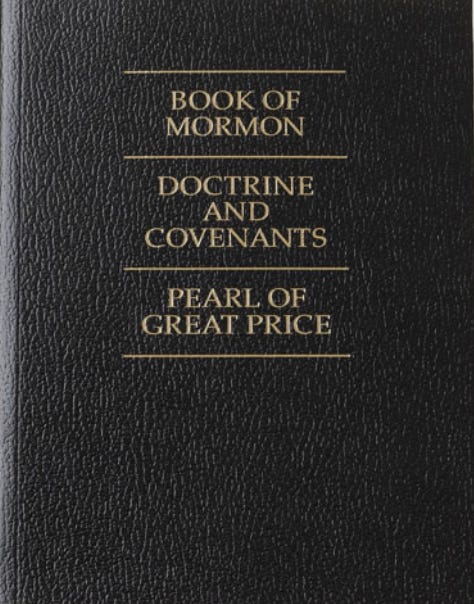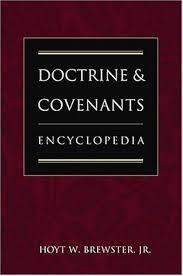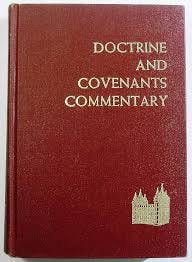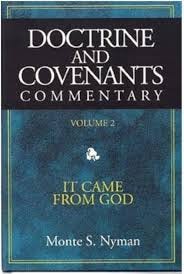In the previous posts I outlined the historical background for Doctrine and Covenants Section 76, and began to study the introduction and early verses in the same section. In this post, let’s continue to examine and appreciate the marvelous vision that is recorded in Doctrine and Covenants Section 76:
And this we saw also, and bear record, that an angel of God who was in authority in the presence of God, who rebelled against the Only Begotten Son whom the Father loved and who was in the bosom of the Father, was thrust down from the presence of God and the Son,
And was called Perdition, for the heavens wept over him—he was Lucifer, a son of the morning.
And we beheld, and lo, he is fallen! is fallen, even a son of the morning!
And while we were yet in the Spirit, the Lord commanded us that we should write the vision; for we beheld Satan, that old serpent, even the devil, who rebelled against God, and sought to take the kingdom of our God and his Christ—
Wherefore, he maketh war with the saints of God, and encompasseth them round about. (D&C 76: 25-29)
It seems as though Joseph Smith and Sidney Rigdon gave us the CliffsNotes version of what they beheld in vision. In this part of the CliffsNotes version of their vision, after a description of the unspeakable glory of the Father and the Son and the holy angels who worship Them, Joseph and Sidney recorded their witness of the most tragic event in the pre-mortal life. In addition to learning much about our dear Savior Jesus Christ, in this section we also learn much about our adversary, the devil.
Because many plain and precious parts of the Bible were lost or removed, and because of the fanciful imaginations and false traditions of men, modern mortals have inherited many erroneous ideas about God as well as about Satan. As magnificent as the poetic works of Dante, Goethe, Milton, and others are, for example, none of them provides us with a clear and accurate understanding of the arch-nemesis of our souls. In this revelation, however, and in other latter-day revelations, the Lord opens our eyes and enlightens our understanding.
The devil, that old serpent, Satan, was once an angel of God. He wasn’t just any angel, rather, he was an angel who was in authority in the presence of God. In his vision, the prophet Moses described the same event that Joseph and Sidney beheld:
And I, the Lord God, spake unto Moses, saying: That Satan, whom thou hast commanded in the name of mine Only Begotten, is the same which was from the beginning, and he came before me, saying—Behold, here am I, send me, I will be thy son, and I will redeem all mankind, that one soul shall not be lost, and surely I will do it; wherefore give me thine honor.
But, behold, my Beloved Son, which was my Beloved and Chosen from the beginning, said unto me—Father, thy will be done, and the glory be thine forever.
Wherefore, because that Satan rebelled against me, and sought to destroy the agency of man, which I, the Lord God, had given him, and also, that I should give unto him mine own power; by the power of mine Only Begotten, I caused that he should be cast down; (Moses 4:1-3)
As an angel in authority in the presence of God, Satan rebelled against Jesus Christ. The prophet Abraham described this same event as follows:
And the Lord said: Whom shall I send? And one answered like unto the Son of Man: Here am I, send me. And another answered and said: Here am I, send me. And the Lord said: I will send the first.
And the second was angry, and kept not his first estate; and, at that day, many followed after him. (Abraham 3:27-28)
In one of my favorite LDS literary works, Orson F. Whitney set this momentous pre-mortal event to poetry:
In solemn council sat the Gods; From Kolob's height supreme, Celestial light blazed forth afar O'er countless kokaubeam; And faintest tinge, the fiery fringe Of that resplendent day, 'Lumined the dark abysmal realm Where earth in chaos lay. Silence self-spelled; the hour was one When thought doth most avail; Of worlds unborn the destiny Hung trembling in the scale. Silence o'er all, and there arose, Those kings and priests among, A Power sublime, than whom appeared None nobler 'mid the throng. A stature mingling strength with grace, Of meek though Godlike mien, The love-revealing countenance Lustrous as lightning sheen; Whiter his hair than ocean spray, Or frost of alpine hill. He spake;--attention grew more grave, The stillness e'en more still. "Father!"--the voice like music fell, Clear as the murmuring flow Of mountain streamlet trickling down From heights of virgin snow. "Father," it said, "since one must die," Thy children to redeem, Whilst earth, as yet unformed and void, With pulsing life shall teem; "And thou, great Michael, foremost fall, That mortal man may be, And chosen Saviour yet must send, Lo, here am I--send me! I ask, I seek no recompense, Save that which then were mine; Mine be the willing sacrifice, The endless glory, Thine! "Give me to lead to this lorn world, When wandered from the fold, Twelve legions of the noble ones That now thy face behold; Tried souls, 'mid untried spirits found; That captained these may be, And crowned the dispensations all With powers of Deity. "A love that hath redeemed all worlds, All worlds must still redeem; But mercy cannot justice rob-- Or where were Elohim? Freedom--man's faith, man's work, God's grace-- Must span the great gulf o'er; Life, death, the guerdon or the doom, Rejoice we or deplore." Silence once more. Then sudden rose Aloft a towering form, Proudly erect as lowering peak 'Lumed by the gathering storm! A presence bright and beautiful, With eye of flashing fire, A lip whose haughty curl bespoke A sense of inward ire. "Give me to go!" thus boldly cried, With scarce concealed disdain; "And hence shall none, from heaven to earth, That shall not rise again. My saving plan exception scorns; Man's agency unknown; As recompense, I claim the right To sit on yonder throne!" Ceased Lucifer. The breathless hush Resumed and denser grew. All eyes were turned; the general gaze On one common magnet drew. A moment there was solemn pause; Then, like the thunder-burst, Rolled forth from lips omnipotent-- From Him both last and first: "Immanuel! thou my Messenger, Till time's probation end. And one shall go thy face before, While twelve thy steps attend. And many more, on that far shore, The pathway shall prepare, That I, the First, the last may come, And earth my glory share. "Go forth, thou chosen of the Gods, Whose strength shall in thee dwell! Go down betime and rescue earth, Dethroning death and hell On thee alone man's fate depends, The fate of beings all. Thou shalt not fail, though thou art free-- Free, but too great, to fall. "By three in heaven, by three on earth,-- By blood that sanctifies, By water of obedience, Spirit that justifies; By every word of mine and thine, Through toil and travail sore, Man, God-redeemed, with God shall be, As God forevermore." 'T was done. From congregation vast Tumultuous murmurs rose; Waves of conflicting sound, as when Two meeting seas oppose. 'T was finished. But the heavens wept; And still their annals tell How one was choice of Elohim, O'er one who fighting fell. A stranger star that came from far, To fling its silver ray, Where, cradled in a lowly cave, A lowlier infant lay; And led by soft sidereal light, The Orient sages bring Rare gifts of gold and frankincense, To greet the homeless King. Oh wondrous grace! Will Gods go down Thus low that men may rise? Imprisoned here the mighty one Who reigned in yonder skies? Hark to that chime!--a tongue sublime, That tells the hour of noon. A dying world is welcoming Life--light of sun and moon. "Peace! peace!"--thy voice, eternity! "Peace!" echoes time's false tone. "Peace! peace!" Is discord then no more? Are earth and heaven as one? Peace, peace, where sparkling hosts proclaim A monarch manger-born; There ruler of unnumbered realms, Here throneless and forlorn. He wandered through the faithless world, A prince in shepherd guise; He called his scattered flock, but few The voice did recognize; For minds upborne by hollow pride, Or dimmed by sordid lust, Ne'er look for kings in begger's garb, For diamonds in the dust. Wept He above a city doomed, Her temple, walls, and towers, O'er palaces where recreant priests Usurped unhallowed powers. "I am the way, the life, the light!" Alas! 't was heeded not; Ignored--nay, mocked God's messenger, And spurned the truth He taught. O bane of damning unbelief! Till now when e'er so rife? Thou stumbling stone, thou barrier 'thwart The gates of endless life! O love of self, and Mammon's lust! Twin portals to despair, Where bigotry, the blinded bat, Flaps through the midnight air. Through these, gloom-wrapt Gethsemane! Thy glens of guilty shade Grieved o'er the sinless Son of God, By gold-bought kiss betrayed; Beheld Him unresisting dragged, Forsaken, friendless, lone, To halls where dark-browed hatred sat On judgment's lofty throne. As sheep before His shearers, dumb, Those patient lips were mute; The clamorous charge of taunting tongues He deigned not to dispute. They smote with cruel palm a face Which felt yet bore the sting; Then crowned with thorns His quivering brow, And mocking, hailed him "King!" Transfixt He hung,--O crime of crimes!-- The God whom worlds adore. "Father, forgive them!" Drained the dregs; Immanuel was no more! No more where thunders shook the earth, Where lightnings, 'thwart the gloom, Saw that unconquered spirit spurn The shackles of the tomb. Far-flashing on its wings of light, A falchion from its sheath, It cleft the realms of darkness and Dissolved the bands of death; Hell's dungeons burst, wide open swung The everlasting bars, Whereby the ransomed soul shall win Those heights beyond the stars.
In the great pre-mortal council in Heaven, Jesus Christ, the Only Begotten Son, whom the Father loved and who was in the bosom of the Father, volunteered and was chosen to be our Savior and Redeemer. When God the Father, Elohim, presented His plan of salvation, Jesus Christ promised to do His Father’s will and to give all glory to Him. Satan, on the other hand, rebelled against Jesus Christ and the Father’s plan. Satan sought to usurp our Father’s glory and to destroy the agency of man. Because of Satan’s rebellion and attempt to destroy our agency, Elohim, by the power of His Only Begotten Son Jesus Christ, caused that Satan should be cast down. Satan was angry, and many followed after him.
We already learned something about this tragic and momentous event earlier in our study of the Doctrine and Covenants:
And it came to pass that Adam, being tempted of the devil—for, behold, the devil was before Adam, for he rebelled against me, saying, Give me thine honor, which is my power; and also a third part of the hosts of heaven turned he away from me because of their agency; (D&C 29:36)
Satan was thrust down from the presence of God and the Son, and he turned a third part of the hosts of heaven away from God and the Son, because of their agency. Isaiah described Satan’s motivations and his fall thus:
How art thou fallen from heaven, O Lucifer, son of the morning! how art thou cut down to the ground, which didst weaken the nations!
For thou hast said in thine heart, I will ascend into heaven, I will exalt my throne above the stars of God: I will sit also upon the mount of the congregation, in the sides of the north:
I will ascend above the heights of the clouds; I will be like the most High.
Yet thou shalt be brought down to hell, to the sides of the pit. (Isaiah 14:12-15)
The Book of Mormon Prophet Lehi described Satan’s fall thus:
And I, Lehi, according to the things which I have read, must needs suppose that an angel of God, according to that which is written, had fallen from heaven; wherefore, he became a devil, having sought that which was evil before God. (2 Nephi 2:17)
And he said unto them, I beheld Satan as lightning fall from heaven. (Luke 10:18)
Or in Joseph Smith’s inspired translation of the Bible:
And he said unto them, As lightning falleth from heaven, I beheld Satan also falling. (JST Luke 10:19)
In their great theophany, a portion of which is described in D&C 76, Joseph Smith and Sidney Rigdon learned more details about this tragic moment in the pre-mortal life. Before he fell, Satan was Lucifer, a son of the morning. When he rebelled and was cast down, the Heavens wept over him. When Satan fell, he was called Perdition. Because he followed Satan, Cain was also called Perdition.
John the Beloved also beheld in vision the fall of Satan, or Lucifer, and the war that was caused by his rebellion:
And there was war in heaven: Michael and his angels fought against the dragon; and the dragon fought and his angels,
And prevailed not; neither was their place found any more in heaven.
And the great dragon was cast out, that old serpent, called the Devil, and Satan, which deceiveth the whole world: he was cast out into the earth, and his angels were cast out with him. (Revelation 12:7-9)
Satan’s fall was so great a tragedy in pre-mortality that the heavens wept over him. Joseph and Sidney beheld this tragic event in vision and the Lord commanded them to write it while they were still under the influence of the Holy Spirit. What they saw defied description, but they recorded the vision in simple terms. In essence, Satan, that old serpent, the devil, rebelled and sought to take the kingdom of our God and his Christ. Because of his rebellion and fall, Satan continues to war against the saints of God and seeks to destroy them and make them miserable as he is. (see D&C 10:27, and 2 Nephi 2:18).
And I saw and bear record of warfare in heaven; For an angel of light, in authority great, Rebell'd against Jesus and sought for his power, But was thrust down to woe from his glorified state. And the heavens all wept, and the tears dropp'd like dew, That Lucifer, son of the morning, had fell! Yea, is fallen! is fallen and become, oh, alas! The son of perdition, the devil of hell! And while I was yet in the spirit of truth, The commandment was--"Write ye the vision all out, For Satan, old serpent, the devil's for war, And yet will encompass the Saints round about."
This is Smith’s and Sjodahl’s commentary on these verses:
Vision of the Fall of Lucifer.
25- 9. The curtain here falls on the glorious scene in which the throne of God and His Son form the radiant center, and another picture is rolled up before the view of the awe-stricken spectators. They see Lucifer rebelling against the Son (v. 25), and thrust down from the divine presence; they see the heavens weeping over him, as he goes to perdition, a fallen being; they see him continuing in rebellion and making war upon the Saints, for the purpose of taking away the kingdom from the Son of God.
Angel of God *** rebelled] In the Pearl of Great Price, Book of Moses 4:1-4, and Book of Abraham, 3:27, 28, we read the particulars of this rebellion. There was a great Council in heaven deliberating concerning the redemption of man. And god said, “Whom shall I send?” We may infer from Scripture passages that there were many mighty angels in the assembly. Lucifer was one of them. He was one of the chief princes. He rose and spoke, “Behold, here am I, send me. I will be thy son, and I will redeem mankind, that one soul shall not be lost, and surely I will do it; wherefore give me thine honor.”
God’s well-beloved Son was also there and He said, “Here am I, send me.” But He added, “Father, thy will be done, and the glory be thine forever.”
Lucifer proposed to destroy the free agency of man and save every soul by compulsion. The Son of God proposed salvation by free choice on the part of man.
Christ’s proposition was accepted; wherefore Lucifer decided to carry out his plan without the consent of the heavenly Council, and to subject the human race to his will. He began his agitation for followers among the spirits, and such was his eloquence and influence that he turned away one-third part of the hosts of heaven from the Son of God (Sec. 29:36, 37). He and his followers were cast out. But they have never ceased to endeavor to establish their kingdom among the children of men, and their efforts are visible in false doctrines, corrupt morals, strife and contention, persecution, and abortive efforts to combat sin by legislation instead of by the influence of the gospel.
Lucifer] The name means “Light-bearer” and indicates the exalted position of him who was so called, for a “light-bearer” is a sun in the firmament. But when he was cast out, he was called Perdition.
-
-
-
Maketh war with the Saints] As the opponent of the Son of God, he makes war on the Saints of God. He has always acted on the false supposition that by imprisoning, burning and otherwise torturing, and murdering the Saints, they would deny Christ, and others would be deterred from joining His people. He is still acting on the same principle, for although prisons are not generally opened to the Saints, yet falsehoods of the blackest dye are told about them in pulpit and press, publicly and privately, until ignorant men and women shun them as they would lepers, while they are coddling to their bosoms the emissaries of the devil who lead them to destruction. The fallen angel still hopes, we may presume, to obtain a large enough following among the children of men to form a strong kingdom of his own. (pp. 450-451)
I appreciate and learn much from Smith’s and Sjodahl’s commentary. I offer one small correction to their particular comments on this topic: God the Father, Elohim, presented His plan, which required the free, moral agency of man and a Savior. Jesus Christ answered His Father’s call. Jesus Christ answered the call first, and He was the Chosen and Beloved Son from the beginning. It was in opposition to both the Father’s plan and the Son’s answer that Lucifer rebelled. Joseph Smith shed further light on this scene in one of his comments that is cited below.
Monte S. Nyman’s commentary on these verses is also instructive:
Joseph and Sidney next beheld the fall of Lucifer from the presence of God (v. 25). Although this fall is documented in the Bible (see Isaiah 14:12 and Revelation 12:7-9) and in the Pearl of Great Price (Moses 4:1-4 and Abraham 3:27-28), there are many additional insights about Satan and the fall revealed in section 76. That he was in a position of authority in the beginning is amplified in the poetic version by the descriptive “authority great.” The titles given him in section 76 are revealing. That he was called “Perdition” explains why the heavens wept over him. According to the dictionary, the word means to destroy, utter destruction, ruin, loss, eternal damnation, hell. According to President Joseph Fielding Smith, Lucifer means a torch bearer. As Isaiah also said, “he was Lucifer, a son of the morning” (Isaiah 14:12). A “son of the morning” is usually interpreted to mean he was one of the arly born of the spirit children of Elohim. Thus, as one of the older of the children of God and being in a position of authority, the title of Lucifer implies he was not only rebelling against God but was leading others to do likewise; therefore, he is designated a torch bearer or crusader against God. In fact, as both Isaiah (see 14:13-14) and this section teach, “he sought to take the kingdom of our God and his Christ.” To do this “he maketh war with the saints of God, and encompasseth them round about” (v. 29). In other words, his primary function on earth is to oppose the work of the Church and its members. He spends considerable time and effort upon the Church members. Therefore, we may be assured that whenever there are members of the Church individually or collectively assembled to further their own spiritual progress or that of the Church, the devil will be there in opposition. In the words of the Prophet Joseph Smith, “In relation to the kingdom of God, the devil always sets up his kingdom at the very same time in opposition to God” (TPJS, 365). (pp. 45-46)
The revelation in D&C 76 continues:
And we saw a vision of the sufferings of those with whom he made war and overcame, for thus came the voice of the Lord unto us:
Thus saith the Lord concerning all those who know my power, and have been made partakers thereof, and suffered themselves through the power of the devil to be overcome, and to deny the truth and defy my power—
They are they who are the sons of perdition, of whom I say that it had been better for them never to have been born;
For they are vessels of wrath, doomed to suffer the wrath of God, with the devil and his angels in eternity;
Concerning whom I have said there is no forgiveness in this world nor in the world to come—
Having denied the Holy Spirit after having received it, and having denied the Only Begotten Son of the Father, having crucified him unto themselves and put him to an open shame.
These are they who shall go away into the lake of fire and brimstone, with the devil and his angels—
And the only ones on whom the second death shall have any power;
Yea, verily, the only ones who shall not be redeemed in the due time of the Lord, after the sufferings of his wrath.
For all the rest shall be brought forth by the resurrection of the dead, through the triumph and the glory of the Lamb, who was slain, who was in the bosom of the Father before the worlds were made.
And this is the gospel, the glad tidings, which the voice out of the heavens bore record unto us—
That he came into the world, even Jesus, to be crucified for the world, and to bear the sins of the world, and to sanctify the world, and to cleanse it from all unrighteousness;
That through him all might be saved whom the Father had put into his power and made by him;
Who glorifies the Father, and saves all the works of his hands, except those sons of perdition who deny the Son after the Father has revealed him.
Wherefore, he saves all except them—they shall go away into everlasting punishment, which is endless punishment, which is eternal punishment, to reign with the devil and his angels in eternity, where their worm dieth not, and the fire is not quenched, which is their torment—
And the end thereof, neither the place thereof, nor their torment, no man knows;
Neither was it revealed, neither is, neither will be revealed unto man, except to them who are made partakers thereof;
Nevertheless, I, the Lord, show it by vision unto many, but straightway shut it up again;
Wherefore, the end, the width, the height, the depth, and the misery thereof, they understand not, neither any man except those who are ordained unto this condemnation.
And we heard the voice, saying: Write the vision, for lo, this is the end of the vision of the sufferings of the ungodly. (D&C 76:30-49)
This is the least pleasant vision and perhaps the most troubling doctrine of the gospel of Jesus Christ, but it is important to understand it correctly. In this third distinct vision of six visions, Joseph and Sidney beheld the awful fate of the sons of perdition. This is the Prophet’s poetic description of these same verses:
And I saw, too, the suff'ring and misery of those (Overcome by the devil, in warfare and fight) In hell-fire and vengeance--the doom of the damn'd; For the Lord said the vision is further, so write: For thus saith the Lord, now concerning all those, Who know of my power and partake of the same; And suffer themselves that they be overcome By the power of Satan, despising my name-- Defying my power, and denying the truth: They are they of the world, or of men most forlorn, The sons of perdition, of whom, ah! I say, 'Twere better for them had they never been born. They're the vessels of wrath, and dishonour to God, Doom'd to suffer his wrath in the regions of woe, Through all the long night of eternity's round, With the devil and all of his angels below. Of whom it is said no forgiveness is found, In this world, alas! nor the world that's to come, For they have deny'd the spirit of God, After having receiv'd it, and mis'ry's their doom. And denying the only begotten of God, And crucify him to themselves, as they do, And openly put him to shame in their flesh, By the gospel they cannot repentance renew. They are they who go to the great lake of fire, Which burneth with brimstone, yet never consumes, And dwell with the devil, and angels of his, While eternity goes and eternity comes. They are they who must groan through the great second death, And are not redeemed in the time of the Lord; While all the rest are, through the triumph of Christ, Made partakers of grace, by the power of his word.
This is Hoyt W. Brewster, Jr.’s entry on “Sons of Perdition” in his Doctrine and Covenants Encyclopedia:
The title “sons of perdition” is found only in one section (D&C 76:32, 43). However, these pitiful people are also referred to by other descriptions (D&C 132:27). The consequences of their devilish deeds are likewise recorded (D&C 76:31-48).
Joseph Smith described how one qualifies for this fate from which there is no redemption. “He must receive the Holy Ghost, have the heavens opened unto him, and know God, and then sin against Him…. He has got to say that the sun does not shine while he sees it; he has got to deny Jesus Christ when the heavens have been opened unto him, and to deny the plan of salvation with his eyes open to the truth of it.” (TPJS, 358.)
“A man must have sufficient knowledge to make him a God in order to be a devil,” declared President George Q. Cannon (GT 1:120-21). Sons of perdition became “angels of the Devil,” said Brigham Young, and it takes just as much preparation to enter the devil’s domain as it does to prepare for celestial salvation; but, of course, the two are opposite extremes (JD 8:154; 3:93).
A son of perdition “commits murder by assenting unto the Lord’s death, that is, having a perfect knowledge of the truth he comes out in open rebellion and places himself in a position wherein he would have crucified Christ knowing perfectly the while that he was the Son of God. Christ is thus crucified afresh and put to open shame.” (DNTC 3:161; see also Heb. 6:4-6.)
Paul referred to “the man of sin” as a “son of perdition” (2 Thess. 2:3), and Joseph Smith identified “the man of sin” as the devil (HC 1:175). Jesus alluded to Judas Iscariot’s being a son of perdition in his great intercessory prayer (John 17:12), and Elder James E. Talmage implied that Judas did qualify for this dubious distinction because “he had received the testimony that Jesus was the Son of God; and in the full light of that conviction he turned against his Lord, and betrayed Him to death” (Talmage, 649-51).
At the end of the Millennium, when Satan is once again loosed, “Men will again deny the Lord, but in doing so they will act with their eyes open and because they love darkness rather than light . . .; they become sons of perdition” (DS 1:87)
See also: Blasphemy Against the Holy Ghost; Crucified Him Unto Themselves; Hosts of Hell; Kingdom Which Is Not a Kingdom of Glory; Ordained unto This Condemnation; Outer Darkness; Resurrection of the Unjust; Sinned unto Death; Spiritual Fall; Spiritually Dead; Third Part of the Hosts of Heaven; Those Who Are to Remain Until the Great and Last Day; Vessels of Wrath; Worm That Dieth Not
(pp. 546-547)
This is Smith’s and Sjodahl’s commentary on these verses and this topic:
A Vision of the Suffering of the Lost.
Again the scene changes. The shadows deepen as the picture of mystery and despair comes into view for a brief moment and then fades away. Some of the children of men will finally be lost, through the influence of the adversary, and this vision is concerning them.
Two questions are involved in the subject of this vision: (a) Who are the lost? (b) What is their fate? To these important questions this Revelation gives the answer.
Made war and overcame] Lucifer, cast out of heaven as a rebel, makes war upon the people of God and becomes the master of some of them. These, if they remain in that servitude, are, finally, lost. Some further details follow:
Know my power] Those who are finally lost are such as have had actual knowledge of the power of God; they have been made partakers thereof; they have not only heard of it or seen its manifestations in others, but they have received it themselves. Paul (Heb. 6:4) uses the expression, “enlightened,” which is equivalent to “baptized,” and is so understood by early Christian authors, because Christian baptism is followed by the reception of the Holy Ghost, who gives light and leads into all truth. He adds, “and have tasted the heavenly gift and were made partakers of the Holy Ghost.” In other words, they have been regenerated by the gospel and received the blessings bestowed through the ordinances thereof; and then they have “suffered themselves to be overcome.” They have denied the truth and have defied the power of God. They have become rebels, like Lucifer. Their status is that of apostasy. The 35th verse should be read here. They have denied the Holy Spirit, after having received it; they have denied the Only Begotten Son, and by that denial, crucified Him, as it were. They have been the servants of Christ but are now enlisted in the service of Lucifer, as were those who crucified the Lord; they belong to the same class.
“The ‘sons of perdition’ are those who have received the gospel, those to whom the Father has revealed the Son; those who know something concerning the plan of salvation; those who have had keys placed in their hands by which they could unlock the mysteries of eternity; those who received power sufficient to overcome all things, and who, instead of using it for their own salvation, and in the interest of the salvation of others, prostituted that power and turned away from that which they knew to be true, denying the Son of God and putting Him to open shame. All such live in the spirit of error, and they love it and roll it under their tongue as a sweet morsel; they are governed by Satan; becoming servants to him whom they list to obey, the become the sons of perdition, doomed to suffer the wrath of God reserved for the Devil and his angels,” Charles W. Penrose, Journal of Discourses, Vol. XXIV., p. 93).
It follows from what has been revealed concerning the sons of Perdition, that they are but a small portion of the human race. Formerly, the gloomy view was widely held that the greater number by far of human beings were doomed to eternal hell-fire. A theologian of the old school said that souls were daily falling into the sulphury lake, as numerous as snowflakes during a winter storm. But this is all wrong. John the Revelator represents the redeemed as “a great multitude which no man could number” (Rev. 7:9). The lost are nowhere so represented. Our Lord will finally triumph over the adversary, even in regard to the number of His followers. Glory to Him for evermore!
36. - 49. The fate, or the final destiny, of the sons of Perdition, is set forth in these paragraphs, as far as God has deemed it wise to give any revelation upon that subject.
36. Lake of fire and brimstone] In all probability this expression has reference to Gehenna, the place outside Jerusalem where all kinds of garbage was consumed by fire, and where, consequently, the flames were never quenched. The bodies of criminals were cremated there. “Hell fire,” in the New Testament, means the “burning Gehenna” (Matt. 5:22). “Damnation of hell” (Matt. 23:33) means the judgment of “Gehenna.” The “gates of hell” (Matt. 16:18) does not refer to Gehenna but to Hades, and means the evil forces of the unseen world. It should be noted that, although “the lake of fire” may be a figurative expression, deriving its meaning from a place in which, not living transgressors but their lifeless bodies were consumed, this does not lessen the awfulness of the fate awaiting the lost. Let those who have no reverence for the exalted Majesty of God, and no regard for His infinite mercy extended to them in the message of the gospel, take warning by the solemn truth placed before them in this metaphor, depicting the final consequences of rebellion under the leadership of Lucifer (Jacob 3:11; see also page 377).
37. Second death] The end of the lost is also called the “second death.” The first is spiritual death. When Adam was expelled from the Garden of Eden, “he became spiritually dead, which was the first death.” But spiritual death is also the last, “which shall be pronounced upon the wicked, when I shall say, Depart, ye cursed” (Sec. 29:41)
38. The only ones who shall not be redeemed] All but sons of perdition will be redeemed from Satan’s power and will find some place outside of his domain. The inhabitants of this earth will be assigned to the telestial, the terrestrial or the celestial kingdom according to the law which they have kept while in mortality. Redemption does not mean exaltation, but to be released from Satan’s chains. These sons of perdition have willed to go with the prince of darkness. They have reached a stage where they cannot repent, for repentance is a gift of God, and they have placed themselves beyond its influence and power.
39-43. These paragraphs point to the fact that all but sons of perdition will be redeemed and obtain some place in one of the three kingdoms. See verses 111--112. Alma states that sons of perdition, while not redeemed because they partake of the second death cannot die again:
“Then I say unto you, they shall be as though there had been no redemption made; for they cannot be redeemed (i.e. from Satan’s power) according to God’s justice; and they cannot die, seeing there is no more corruption. (Alma 12:17-18.)
44. Everlasting punishment] The subject of the fate of the lost is resumed here (See Sec. 19:4-12).
To reign with the devil] This is a peculiar, but a highly significant expression. The Lord is the sovereign ruler. He reigns. Sin is said to reign, when men submit to its behests. Grace is also said to reign (Rom. 5:21). The Saints will reign with Christ. But here the sons of Perdition are said to “reign” with the Devil and his angels in eternity, in the place where the worm dieth not and the fire is not quenched. The conflict between Lucifer and the Son has been, from the beginning, for sovereignty. Men have ranged themselves on one side or the other. The Saints are, and will be, citizens and officials in the Kingdom of God and there they will “reign,” as citizens in a free country. The sons of Perdition are, and will remain, citizens and officials in the kingdom of Lucifer. But that kingdom will, finally, be confined to Gehenna. There they will “reign,” under such laws and rules as obtain in the kingdom of the Devil, and of which we have had numerous illustrations in human history, during the dark ages of ignorance, superstition, tyranny, and iniquity. Think of a place where the evil passions of human beings and evil spirits rage, unrestrained by the influence of the gospel! Such is the kingdom of the Devil, where the sons of Perdition will reign.
Which is their torment] Not literal fire! The necessity of living in a place where the Devil is the supreme ruler and applies the law of compulsion to minutest details of existence, and where, consequently, hatred consumes every hearts, is torment enough.
45. The end thereof] Is there an end? If so, it is not known to man. Neither is the place known. But there is a place. The kingdom of the lost is not only a condition, a state. It is a real place. Nor can any man fathom the intensity of the misery of the lost. (I. Ne. 15:34, 35.)
46. Neither was it revealed *** unto man] These things have not been revealed.
47. I, the Lord, show it by vision] Many have had a vision of the final destiny of the lost, but the Lord closes the view immediately, and no man can form any conception of it.
48. Except them who are ordained unto this condemnation] Not foreordained, in the sense of pre-elected by God, to condemnation. God has ordained that rebellion against Him shall result, if persisted in to the end, in misery, but He has not foreordained anyone to that fate. A legislature may ordain that thieves must be imprisoned and murderers killed, but that does not mean that it has foreordained any individual, or any number of individuals, to do that which ends in imprisonment, or death. The sons of Perdition pursue their course according to their own choice, and not as victims of inexorable destiny. (pp. 452-455)
Monte S. Nyman’s commentary on these verses and this topic is also instructive:
Having seen the glory of God and the fall of Satan, Joseph and Sidney were now shown the eternal destinies of the earth’s inhabitants in a series of four visions. The order of the next four visions is interesting. As members of the Church, we usually speak of the various kingdoms in the descending order of celestial, terrestrial, telestial, and those who qualify for none of the above, the sons of perdition. In this revelation, the sons of perdition are treated first and then the celestial, terrestrial, and telestial kingdoms. While this may have been merely for contrast, there may be another purpose for this order. The sons of perdition had known and experienced the principles of exaltation necessary for the celestial kingdom and then had rejected them, choosing to follow Satan. Therefore, laws designed for exalting God’s children will result in one becoming a son of perdition if he meets the requirements for exaltation and then commits the unpardonable sin.* This concept is supported by there being a definition of the gospel (see vv. 40-43) inserted within the description of the vision, concerning the sons of perdition. By comparison, the division of the terrestrial and telestial peoples is caused by their following or failing to follow lesser portions of the laws that are given to make men honorable, but not like unto God.
What was seen in the vision of those who were overcome by Satan (sons of perdition) was not recorded. However, what the Lord said about the vision was recorded (v. 30). From the Lord’s description, we learn that those who were overcome had not only come to a knowledge of the power of the Lord but had experienced that power in their lives. The Lord also explained that these people had chosen to follow Satan, they had suffered (allowed) themselves to be overcome. The poetic version says they were guilty of “despising [Christ’s] name.” Having had such a spiritual experience, their rebellion means they “deny the truth and defy my power.” This further substantiates their willful disobedience.
Many years after he had seen this vision, the Prophet Joseph commented:
“The contention in heaven was - Jesus said there would be certain souls that would not be saved; and the devil said he could save them all, and laid his plans before the grand council, who gave their vote in favor of Jesus Christ. So the devil rose up in rebellion against God, and was cast down, with all who put up their heads for him.
All sins shall be forgiven, except the sin against the Holy Ghost; for Jesus will save all except the sons of perdition. What must a man do to commit the unpardonable sin? He must receive the Holy Ghost, have the heavens opened unto him, and know God, and then sin against Him. After a man has sinned against the Holy Ghost, there is no repentance for him. he has got to say that the sun does not shine while he sees it; he has got to deny Jesus Christ when the heavens have been opened unto him, and to deny the plan of salvation with his eyes open to the truth of it; and from that time he beings to be an enemy. This is the case with many apostates of the Church of Jesus Christ of Latter-day Saints.
When a man beings to be an enemy to this work, he hunts me, he seeks to kill me, and he never ceases to thirst for my blood. He gets the spirit of the devil - the same spirt that they who had crucified the Lord of Life - the same spirit that sins against the Holy Ghost. You cannot save such persons; you cannot bring them to repentance; they make open war, like the devil, and awful is the consequences.” (TPJS, 357-58]
In describing the fate of the sons of perdition, the Lord uses several New Testament phrases (see Matthew 26:24; 12:32; Hebrews 6:6; Revelation 19:20), and concludes with the declaration that these are “the only ones on whom the second death shall have any power; yea, verily the only ones who shall not be redeemed….” (vv. 37-38). Some conclude from this declaration that the sons of Perdition will not be resurrected, basing their conclusion on “all the rest shall be brought forth by the resurrection of the dead” (v. 39). A careful reading of section 88 shows that redemption, as used here, refers to receiving a degree of glory after the Resurrection and not the Resurrection, per se (see D&C 88:25-32). The New Testament and Book of Mormon also repeatedly teach a universal resurrection, and modern-day prophets have confirmed that sons of perdition will be resurrected.
The Lord concluded his remarks about what Joseph and Sidney had seen concerning the sons of perdition by declaring that only those “who are made partakers thereof,” or “are ordained to this condemnation,” will ever know the torment, the misery, and the end of such punishment (D&C 76:46-49). Over a year later, June 1833, in a letter to W. W. Phelps and others in Zion, the Prophet and his counselors reaffirmed what the Lord had stated in the Revelation: “Say to the brothers Hulet and to all others, that the Lord never authorized them to say that the devil, his angels, or the sons of perdition, should eve be restored; for their state of destiny was not revealed to man, is not revealed, nor ever shall be revealed, save to those who are made partakers thereof: consequently those who teach this doctrine have not received it of the Spirit of the Lord. Truly Brother Oliver declared it to be the doctrine of devils. We, therefore, command that this doctrine be taught no more in Zion. We sanction the decision of the Bishop and his council, in relation to this doctrine being a bar to communion” (TPJS, 24).
Therefore, we should not speculate concerning these things. Our goal is to achieve the celestial kingdom, and we would profit more by seeking an understanding of how to achieve his goal than by speculating about the sons of perdition. Those who are striving for this celestial goal will naturally avoid the pitfalls that lead to becoming a son of perdition.
Although a candidate for the celestial kingdom is also a candidate for becoming a son of perdition (if he rebels and defies God), as long as he seeks knowledge and gives heed to the commandments, he will attain salvation. Joseph Smith described it this way:
“A man cannot commit the unpardonable sin after the dissolution of the body, and there is a way possible for escape. Knowledge saves a man; and in the world of spirits no man can be exalted but by knowledge. So long as a man will not give heed to the commandments, he must abide without salvation. If a man has knowledge, he can be saved; although, if he has been guilty of great sins, he will be punished for them. But when he consents to obey the Gospel, whether here or in the world of spirits, he is saved.
A man is his own tormenter and his own condemner. Hence the saying, They shall go into the lake that burns with fire and brimstone. The torment of disappointment in the mind of man is as exquisite as a lake burning with fire and brimstone. I say, so is the torment of man.
I know the scriptures and understand them. I said, no man can commit the unpardonable sin after the dissolution of the body, nor in this life, until he receives the Holy Ghost; but they must do it in this world. Hence the salvation of Jesus Christ was wrought out for all men, in order to triumph over the devil; for if it did not catch him in one place, it would in another; for he stood up as a Savior. All will suffer until they obey Christ himself. [TPJS, 357] (Monte S. Nyman, Doctrine and Covenants Commentary, Vol. 2., It Came from God, pp. 47-50)
*President Brigham Young taught: “How much does it take to prepare a man, or woman, or any being, to become angels to the devil, to suffer with him to all eternity? Just as much as it does to prepare a man to go into the celestial kingdom into the presence of the Father and the Son, and to be made an heir to His Kingdom, and all His glory, and be crowned with crowns of glory, immortality, and ternal lives” (Journal of Discourses, 3:93).



